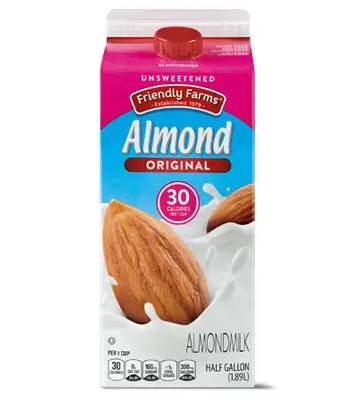Food Nutrition Facts
Nutrition Facts For
Milk - Almond - Unsweetened
Portion Size: 1 Cup
| Nutrient | Value | % Daily Value* |
|---|---|---|
| 30.0 kcal | 2% | |
| 2.5 g | 0% | |
| 0.0 g | 0% | |
| 0.0 mg | 0% | |
| 170 mg | 7% | |
| 35.0 mg | 1% | |
| 1.0 g | ||
| 0.5 g | ||
| 0.5 g | ||
| 0.5 g | ||
| 1.0 g | ||
| Milk Substitute |
*Daily value based on a 2,000 calorie diet. Your daily values may be higher or lower depending on your calorie needs and health goals.
Calculate your daily calorie needs here
Nutrition Facts For 1 Cup of Milk - Almond - Unsweetened

Unsweetened almond milk offers a wealth of nutritional benefits, making it a popular choice for those seeking a healthy alternative to dairy milk. It's naturally low in calories and fat, yet provides essential vitamins and minerals, including vitamin E, which acts as an antioxidant, and often calcium and vitamin D, which are crucial for bone health. Furthermore, unsweetened almond milk is typically free of cholesterol and saturated fat, contributing to heart health. Its low carbohydrate content also makes it a suitable option for individuals managing their blood sugar levels or following a low-carb diet.
Beyond its nutritional profile, unsweetened almond milk is a versatile beverage that can be incorporated into a variety of dietary plans. It's naturally lactose-free, making it an excellent choice for those with lactose intolerance or dairy sensitivities. Its mild, slightly nutty flavor complements cereals, smoothies, coffee, and even savory dishes. Whether you're looking to reduce your calorie intake, increase your vitamin and mineral intake, or simply prefer a plant-based beverage, unsweetened almond milk offers a refreshing and nutritious option.







